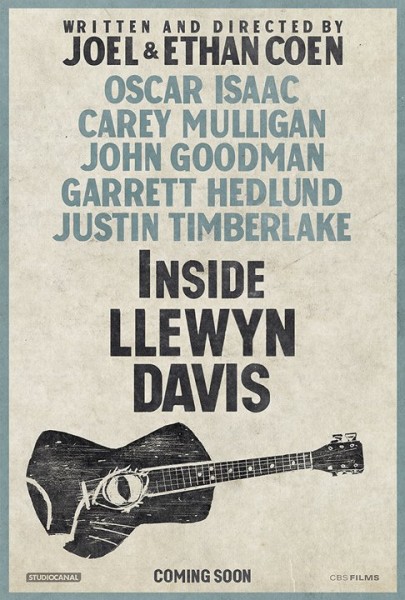“Inside Llewyn Davis” may be the Coen Brothers most character-driven and intimate movie yet, and that says quite a bit coming from the fellas that brought us “The Man Who Wasn’t There,” “Barton Fink” and “A Serious Man.” Taking inspiration from a memoir by a 1960’s folk singer, “Inside Llewyn Davis” shows us one week in the life of a folk singer struggling to make it while simultaneously painting a portrait of the 60’s New York City folk scene, all centered on one guy who is pretty talented but also kind of an ass. Ahh the Coens.
Llewyn Davis (Oscar Issac) is indeed talented and throughout the movie we get a few glimpses of that talent when he performs, and during these moments we can see an idealized Llewyn Davis, using his skills to try to reach his full potential, and he’s actually bringing joy and pleasure to those around him through his folk singing and guitar playing.
This all stands in stark contrast to the rest of his waking life, in which he goes around couch surfing on different friends’ sofas night after night, he curses in front of his sister’s kid and insults her and their own father when he suggests that a life working a “normal job” would be merely “existing,” he constantly judges the musical output of others (obviously seeing himself as superior to everyone around him), he gets drunk and becomes loud and belligerent, and he’s also a bit of a sourpuss, which makes him even less pleasant to be around.
Yet Llewyn Davis is one of these guys, the kind that manages to get most people to still like him enough to hang around with him and give him a place to crash, though sometimes he has to come crawling back to them asking for forgiveness for a prior outburst of assholeness. Perhaps people see the potential and want to help in some way foster this talent, or maybe they happen to see past the jerky qualities and they see the nice guy that Llewyn can be sometimes, but whatever it is, this guy still has a small handful of friends and even manages to convince women to sleep with him every now and then, much to their consternation afterwards.
The whole movie balances between funny and sad, in that way that is unique to the Coens – their movies are filled with odd characters and weird events, yet it all boils down to something much more identifiable. Even when Llewyn finds himself on a strange road trip to Chicago with an old and ornery jazz man (John Goodman), his valet slash beat poet driver (Garrett Hedlund), all the while lugging around a cat that doesn’t even belong to him, the Coens find universal elements in the stretches of silence, the depressing landscapes, the small bits of conversation that do crop up here and there. Even if we’ve never met anyone exactly like Llewyn Davis, we all have in the past or presently know people very similar to him.
I’m going to get into some plot specifics for the next few paragraphs, so if you have not seen this movie yet, you may want to go ahead and skip to the last very paragraph. This week we are privy to in Llewyn’s life ends up being a rather important one, or so it seems anyway in the immediacy of the moment. Llewyn is at the end of his rope here, having been abandoned by his musical partner and struggling to find any traction as a solo artist, his trip to Chicago to see a legendary club promoter ends up being his last gasp at making a real, honest living out of his artistic expression. So when the promoter tells him to his face that there is no potential there for success, Davis takes it to heart and simply packs his bags and makes his way back to New York, ready to announce his retirement from music and get back into the merchant marines. He wasn’t just giving up on himself, but he was giving up on the folk music scene in general, thinking it had no potential at all. So of course we the audience know this is a bitter, bold and probably bad move, especially as Davis gets a quick glimpse of a very young Bob Dylan playing a little diddy, his unique voice and styling unmistakable.
Llewyn Davis is actually full of bad decisions in this movie, one of them being his passing up of a chance to catch up with an old girlfriend, where a chapter of his life he thought was closed actually remains opened and evolving without his knowledge, and another decision being his knocking up of a married woman (Carey Mulligan). That leads directly to another bad decision, one in which he signs away his royalty rights to a weird 60’s pop song for $200, a song that will obviously become a huge hit because it’s catchy and silly and this is a Coen brothers movie so it just HAS to be a hit. And that $200? Pays for the abortion. His net gain from doing this song? Permission to continue living his miserable life with having to be responsible for anyone other himself, and even that he’s screwing up royally. So can we blame him for quitting? Should we look down on him? Should we feel pity for this guy when he gets his ass handed to him by an old man? Or did Llewyn deserve the beating, just like he deserves to have life shit on him for awhile, because he’s kind of shitty. Should we feel bad for him when he steps in a slushy puddle of freezing cold water and has to walk around with a wet sock and change in his pocket? Or should we tell him he deserves it and he should get out there and get a damn job and stop pretending he is some great, starving artist already?
This is a typically very well made Coen brothers movie, albeit a small one altogether. The “plot” turns so tightly on who these people are and what they reveal about themselves to each other (and to us) throughout the story, it just makes for a pleasure to watch unfold. Without having a “typical” storyline to follow, it really is hard to see where this movie was going as it was getting there, yet when it ended, it all seemed so right, like this was the only way it could have ended. A sign of a great movie, “Inside Llewyn Davis” is a movie that is going to be worth revisiting.


 #581 – Dune Lies Bleeding
#581 – Dune Lies Bleeding Netflix pick for 9/14/15 – ‘The Homesman’
Netflix pick for 9/14/15 – ‘The Homesman’ Spillover Bonus Episode – Delete Your Tweets
Spillover Bonus Episode – Delete Your Tweets Bonus Episode – Dr. Anna Lepeley
Bonus Episode – Dr. Anna Lepeley
Leave a Reply
You must be logged in to post a comment.